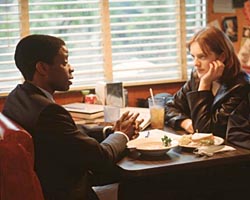Intentionally or not, everyone forms instantaneous judgments of others based on their appearances and backgrounds. William Shakespeare’s tragedy Othello illustrates the theme that preconceived notions such as racism may effect and advance unwarranted disdain for other individuals. Because Shakespeare’s theme recurs in works such as J. K. Rowling’s novel Harry Potter and the Chamber of Secrets and Aaron Sorkin’s television series The West Wing, Othello is timeless and universal.
In Othello, Iago hates the general Othello from the very first scene. The general has selected Cassio as his lieutenant whose experience on the battlefield cannot compare with that of Iago. Additionally, Iago references a rumor that Othello has had an affair with Emilia, Iago’s wife; whether or not that rumor holds true, the antagonist intends to “do as if for surety” (I.iii.369). Although these two central issues motivate Iago to hatch a plot against Othello, his blatant racism further invigorates his contempt for Othello. While informing Brabantio that his daughter Desdemona has married Othello, Iago shouts, “Even now, now, very now, an old black ram / Is tupping your white ewe” (I.i.88-89). The mischievous villain compares Othello to an animal more than once, and he casually refers to his general as “the Moor” with an insulting tone. Of all the characters in the play, Iago displays the most potent racism. Later, the antagonist plants a single rumor that entangles Othello and his companions: “Look to your wife. Observe her well with Cassio” (III.iii.198). Though not the primary reason for his hatred of Othello, Iago’s racism supplements and advances his contempt for the Moor.
As the second installment of perhaps the modern world’s most popular book series, Harry Potter and the Chamber of Secrets tackles Shakespeare’s theme of disdain based on prejudice. Harry’s classmate and adversary Draco Malfoy despises Gryffindor house, to which Harry, Ron, and Hermione belong. In this novel, Malfoy flaunts Slytherin’s new broomsticks to the Gryffindor team – “‘Everyone’s just been admiring the brooms my father’s bought our team’” – and after Hermione observes the inferiority of the Slytherins’ wealth to the Gryffindors’ talent, Malfoy insults her by saying, “‘No one asked your opinion, you filthy little Mudblood’” (Rowling, 112). Ron later clarifies, “‘Mudblood’s a really foul name for someone who is Muggle-born – you know, non-magic parents’” (Rowling, 115). Malfoy enjoys a wealth of reasons to hate Hermione; she is intelligent belongs to a rival house. His prejudice against Muggle-born wizards and witches further intensifies his contempt for her, and accordingly, Malfoy’s relationship with Hermione and her friends remains sour throughout the entire series. Like Iago, Malfoy prematurely judges based on lineage, and his rapport with other characters suffers.
In addition to the Harry Potter series, the television drama The West Wing shares themes of racism and derision with Othello. Partway through the first season, President Bartlet informs his daughter Zoey of derogatory letters she has received due to her relationship with Charlie Young. Charlie is both the personal aid to the president and a young black man. After hearing about the dangerous letters, Zoey cancels her date with Charlie at a club near which white supremacists are holding a rally (Sorkin, “The While House Pro-Am”). Here, Charlie’s enemies find ways to manipulate his dating life with no motives beyond pure racism. The second season follows a shooting during which President Bartlet and Deputy Chief of Staff Josh Lyman are wounded, and the Secret Service discovers that the criminals are white supremacist teenagers. Charlie expresses confusion as to why the teenagers would have targeted the president; Agent Butterfield responds, “The president wasn’t the target” (Sorkin, “In the Shadow of Two Gunmen, Part II). Young racist teenagers despise the president’s personal aid solely because of the color of his skin, and they nearly assassinate the president of the United States out of their contempt. Shakespeare writes of the same racism that energizes Iago’s hatred of the Moor.
Othello’s theme of the consequences of prejudice applies not only to Shakespeare’s setting but also to modern cultures. Unfortunately, discrimination like racism, a constant component of most societies, shows no signs of termination. Other common forms of prejudice – judging someone’s clothes, hair, or speech – are even more prevalent and take place in the minds of nearly every individual on the planet. Though everyone is subject to these snap judgments, how one responds to his immediate assessments of others defines his true character.
Works Cited
Perrine, Laurence. “Othello.” Perrine’s Literature: Structure, Sound, and Sense. Fort Worth. Harcourt College. 2002. 1361-462. Print.
Rowling, J. K. “Chapter Seven: Mudbloods and Murmurs.” Harry Potter and the Chamber of Secrets. New York: Scholastic, 1999. Print.
Sorkin, Aaron. “In the Shadow of Two Gunmen, Part II.” The West Wing. Dir. Thomas Schlamme. NBC. 4 Oct. 2000. Television.
Sorkin, Aaron, Lawrence O'Donnell Jr., and Paul Redford. “The White House Pro-Am.” The West Wing. Dir. Ken Olin. NBC. 22 Mar. 2000. Television.


No comments:
Post a Comment